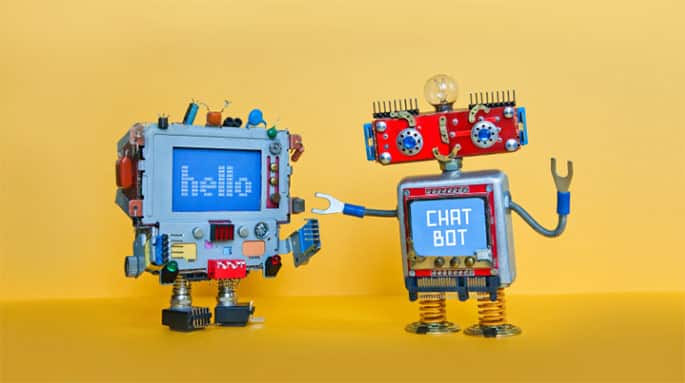Artificial intelligence has a lot to offer, but it is not the answer to all marketing efforts. What is already possible today? And which AI problems need to be overcome? Below is a fair estimation.
“The possibilities of artificial intelligence in the marketing field are infinite.” I come across many statements such as this in blog posts and press releases. Though AI certainly promises to be a significant help in the coming years, I have to disappoint you a little bit: AI is not the answer to all marketing challenges.
3 Artificial Intelligence Case Studies
Of course, the science behind AI has proven to be a practical application in a number of fields. Below, I sum up some great examples:
1. Security: Recognizing Suspect Patterns
By recognizing patterns in huge mountains of data, AI can track down fraudsters, hackers, and terrorists.

Take, for example, Danske Bank, a financial services leader in Nordic countries. The bank worked with Think Big Analytics to create and launch an AI-driven fraud detection platform. The engine uses machine learning to analyze tens of thousands of features, scoring millions of online banking transactions in real-time to provide insight regarding true – and false – fraudulent activity.
2. Logistics: Taking the Best Route
Based on historical and real-time data, AI can advise how most efficiently a task can be carried out, resulting in lower costs.
Fleet management is a case in point. While complying with stringent safety and environmental regulations, fleet operators strive to achieve the lowest possible total cost of ownership (TCO) for their fleets. Through AI and real-time data of road traffic, the most efficient routes can be identified, resulting in lower costs and as an added benefit, help reduce environmental pollution.
3. Predictive Maintenance: Safeguarding Heat Comfort
Machines that are connected to the Internet (Internet of Things) generate data. Artificial Intelligence can analyze this data to predict when repair or maintenance is needed. This increases efficiency and decreases costs.

An example of this is the predictive maintenance for BDR Thermea’s boiler. This service helps to predict the general status of a boiler in order to prevent an outage. In this way, loss or degradation of heat comfort is prevented.
At RevelX, we helped BDR Thermea develop this predictive maintenance feature as a minimum viable product (MVP). It was successfully introduced into the market in 2017.
Examples of Artificial Intelligence in Marketing
Yes, AI can help marketers, too. Smart algorithms can draw conclusions by combining big sets of data. For example, a combination of buying behavior, demographic data, and real-time clicks can lead to a personalized online advertisement.
Take, for instance, the online lingerie company Adore Me. This US brand wanted to segment its customer list into different types of prospects and customers in order to increase purchases and grow subscriptions within its membership pricing program.

Optimove’s AI accomplished this task by automating the segmentation process. The AI solution sent customized content based on each recipient’s lifecycle stage via email, text messages, and in-app notifications. The results were amazing: Adore Me doubled its active customer base.
3 Artificial Intelligence Bottlenecks
The happy marriage of AI and marketing is exemplified by the Adore Me case study above. However, there are bottlenecks when it comes to the practical application of AI in the marketing field:
- AI doesn’t take the context into account. If a unique event with a significant impact occurs, such as breaking news, an AI solution will not react to this. This can lead to content that conveys the wrong message, for example an advertisement for a flight to a place where a terror attack just happened.
- AI can generate suspicion among consumers and lead to a counterproductive effect. Privacy is an increasingly important issue. With a personalized marketing experience, the customer may feel that his/her privacy is at stake and turn away from the company as a result.
- AI can perform clearly defined tasks, such as writing a simple text based on a pre-made format. However, true creativity remains reserved for human beings.
My conclusion is that AI is taking over the world fast, but that people will never become obsolete – fortunately! It will be the combination of creative people and their smart software that will shape a bright future.
Margot Hoogendoorn
Growth consultant combining analytical skills with creativity and a contagious laugh.
Related posts
5 Growth Mindset Examples That You Can Use in Your Job Tomorrow
People who believe their success is based on hard work,…
September 15, 2022
Retention strategy: Keeping the right customers
Retaining customers is a top-line priority for any…
May 15, 2020
Who are my most valuable customers?
Legend has it Alfredo Pareto noticed something unusual in…
April 22, 2020



